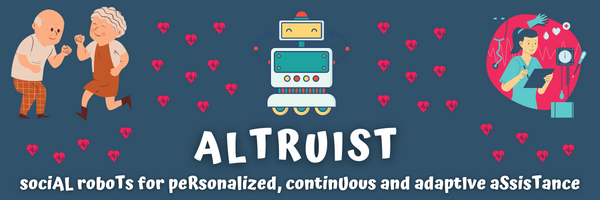4th Workshop on “sociAL roboTs for peRsonalized, continUous and adaptIve aSsisTance”
Held in conjunction with the 33rd International Conference on Robot and Human Interactive Communication,. IEEE RO-MAN 2024
Under the current conditions of demographic change and recent epidemiological developments, society is challenged to provide high-quality care that can be financed in the long term. Due to the lack of medical professionals, growing healthcare costs, and the exponential rise in the population of vulnerable groups like people with chronic diseases, and children with developmental disabilities, the use of social robots in the healthcare system is expanding. As a result, innovative digital and robotic systems are increasingly entering the nursing sector, where innovative technologies are intended to support nursing staff and contribute to improving the quality of care. Social robots are employed in the medical field to entertain and educate hospitalized patients about health issues, as well as to assist the frail and sick. They are also employed in the dispensing of medications, rehabilitation, and emotional and cognitive care. Consequently, human-robot collaboration in healthcare will increase since it might be very beneficial to relieve medical personnel of their technical systems.
Hence, innovative interventions embedded with e-health applications are critical to improving the health of the population and the health literacy of this population. Novel assistive solutions and technologies are necessary to properly deal with the increasing demand for personalized assistance and support of multiple users in different scenarios. Such solutions should be capable of effectively merging heterogeneous and potentially conflicting requirements coming from different stakeholders bridging the gap between the health needs of users and clinical and social requirements. In this context, the increasing demand for personalized, continuous, and adaptive assistance from the frail population can be effectively addressed only through a multidisciplinary approach. The synergetic contribution of different research areas e.g. Artificial Intelligence (AI), Internet-of-Things (IoT), Robotics, and Social Science is crucial for delivering innovative and impactful results and technologies.
The workshop aims to collect contributions from experts (scholars, researchers, Ph.D. students as well as practitioners) in Artificial Intelligence and Robotics and other crossing disciplines involved in the development of innovative and effective research and technologies for personalized assistance of frail people. The workshop will pursue a multi-disciplinary approach by collecting knowledge and experiences from heterogeneous disciplines and also experiences from stakeholders to show how efforts from technological and non-technological actors would add value to the promotion of innovative assistive systems. It would represent a place to share opinions, explore innovative ideas, and provide suggestions on current research.
Workshop Organizers
- Laura Fiorini, University of Florence, Italy
- Francesca Fracasso, CNR – Institute of Cognitive Sciences and Technologies (CNR-ISTC), Italy
- Alessandra Sorrentino, University of Florence, Italy
- Alessandro Umbrico, CNR – Institute of Cognitive Sciences and Technologies (CNR-ISTC), Italy
